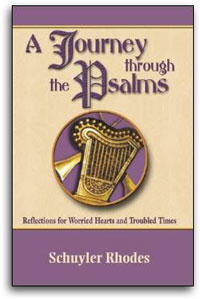Psalm 62:5-12
Preaching
A Journey Through the Psalms: Reflections for Worried Hearts and Troubled Times
Preaching the Psalms Cycles A, B, C
Object:
The storybooks of our faith are full of heroes and martyrs who have insisted on the sovereignty of God in their lives. From the biblical account of Stephen succumbing to a hail of stones right up to the assassination of Archbishop Oscar Romero, these stories populate the landscape of Christendom. Yet, in our contemporary lives we set ourselves strangely apart from them. The Greek word, of course, is martus, meaning "witness."
Today, however, martyrdom has been shunted aside as something best dealt with on a psychologist's couch. Instead of seeing a martyr as a heroic witness to our faith, contemporary sensibilities have identified it as a diagnosis. Having dispensed with such uncomfortable notions, the idea of standing resolutely for something fades to black in our television-screen consciousness.
It's true. Those who insist on maintaining God as their "rock and their salvation," who place their hope and their trust in God alone, are usually a stubborn lot, and stubborn people don't often fare well in the mainstream of reality. Indeed, it's been said that if Stephen were a little more agreeable, slightly more malleable, that he might well have been spared. Indeed, if Archbishop Romero had tempered his homilies against the death squads he, too, might still be serving Eucharist, instead of lying prone amidst the wine and the host.
Yet, in all this it must be said that ours is such a faith. This psalm lays it on our doorstep and dares us to step over it on our way into the rest of our lives. We read that God is our deliverer; that our trust is to be in God and no one else, and carrying on, we learn that power belongs to God. Not to guns or government, not to market forces or police forces, but to God and God alone. Extreme, you say? Perhaps. But such a sentiment hardly exists in isolation within our tradition. Check out the first of the Ten Commandments for starters.
For us this is no easy walk in the park. In the midst of lives where a host of entities compete for our loyalty, how do we wait upon "God alone"? While we may not wish to put our confidence in extortion or robbery, it doesn't take a rocket scientist to look around and see that much of the world does. What, we are left to ask, is a Christian to do? How are we to place our trust in God and God alone? How do we live fully and faithfully before our God?
Perhaps, as it has throughout our history, the answer begins in community. Maybe faithfulness starts in the context of love and trust in the congregation. Could it be that relationships formed in faith and lived out in covenant are where our faithfulness to God begins? It would seem that the answer needs to be, "Yes."
Do such leanings leave us out on a limb? Probably, but if the branch breaks, at least we know where our prayers will be going.
Today, however, martyrdom has been shunted aside as something best dealt with on a psychologist's couch. Instead of seeing a martyr as a heroic witness to our faith, contemporary sensibilities have identified it as a diagnosis. Having dispensed with such uncomfortable notions, the idea of standing resolutely for something fades to black in our television-screen consciousness.
It's true. Those who insist on maintaining God as their "rock and their salvation," who place their hope and their trust in God alone, are usually a stubborn lot, and stubborn people don't often fare well in the mainstream of reality. Indeed, it's been said that if Stephen were a little more agreeable, slightly more malleable, that he might well have been spared. Indeed, if Archbishop Romero had tempered his homilies against the death squads he, too, might still be serving Eucharist, instead of lying prone amidst the wine and the host.
Yet, in all this it must be said that ours is such a faith. This psalm lays it on our doorstep and dares us to step over it on our way into the rest of our lives. We read that God is our deliverer; that our trust is to be in God and no one else, and carrying on, we learn that power belongs to God. Not to guns or government, not to market forces or police forces, but to God and God alone. Extreme, you say? Perhaps. But such a sentiment hardly exists in isolation within our tradition. Check out the first of the Ten Commandments for starters.
For us this is no easy walk in the park. In the midst of lives where a host of entities compete for our loyalty, how do we wait upon "God alone"? While we may not wish to put our confidence in extortion or robbery, it doesn't take a rocket scientist to look around and see that much of the world does. What, we are left to ask, is a Christian to do? How are we to place our trust in God and God alone? How do we live fully and faithfully before our God?
Perhaps, as it has throughout our history, the answer begins in community. Maybe faithfulness starts in the context of love and trust in the congregation. Could it be that relationships formed in faith and lived out in covenant are where our faithfulness to God begins? It would seem that the answer needs to be, "Yes."
Do such leanings leave us out on a limb? Probably, but if the branch breaks, at least we know where our prayers will be going.


